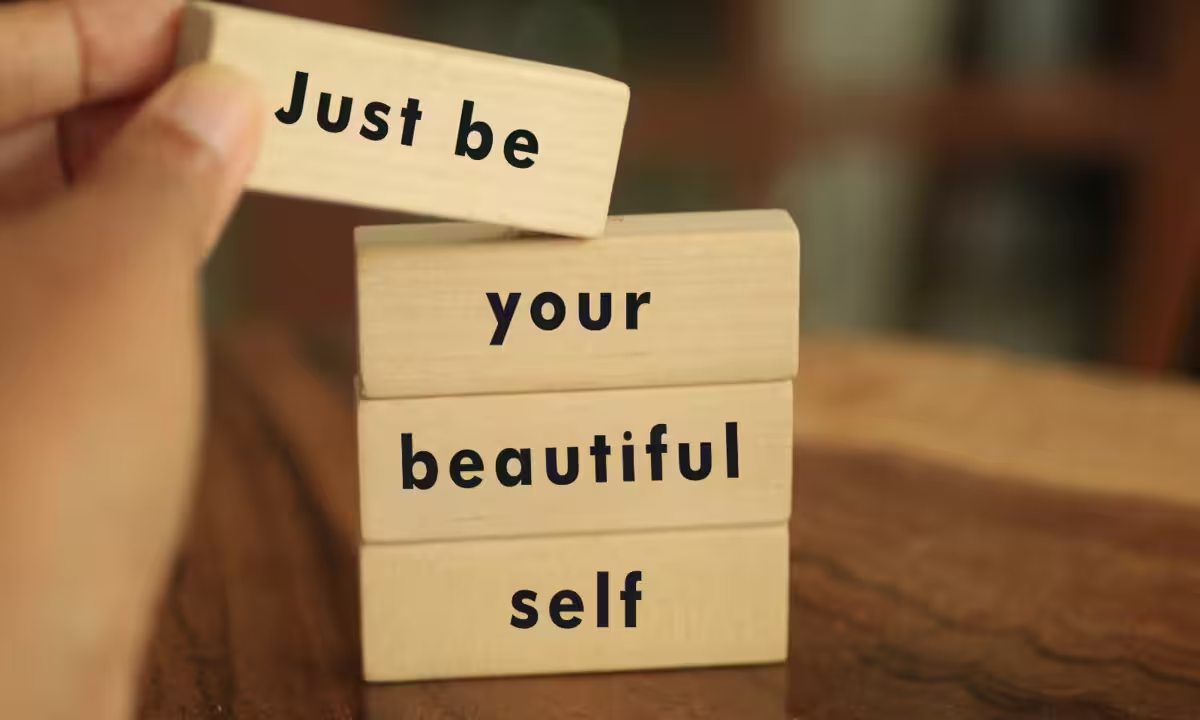How to Find Your True Self: A Practical Guide to Authentic Identity

Most people spend years trying to become someone better. They set goals, build habits, and chase improved versions of themselves. But psychology research shows the real work is removal, not addition.
Your true self was not lost. It was covered by approval‑seeking, childhood survival patterns like those Donald Winnicott called the “false self,” and relationships that forced you to shrink.
If you seek deeper ways to self‑explore and find your true self, start by identifying these layers.
This guide delivers a research‑backed process: you learn what psychology says about authentic identity, the origins of the false self, and six concrete steps to shift from self‑editing to grounded expression.
- Your true self already exists beneath the roles, habits, and survival patterns you built over time.
- The false self forms in childhood as a protection response, not a character flaw.
- Research from the University of Missouri across five studies shows that true self-concept accessibility directly predicts your sense of meaning in life.
- Six concrete steps, including values clarification and shadow work, move you back toward authentic identity.
- Therapies like IFS, EMDR, somatic therapy, and Gestalt each address different roots of identity disconnection.
What Is the True Self?
Your true self is the core of your personality that exists independent of social roles, approval-seeking, or conditioning. It includes your authentic values, instincts, desires, and emotional responses before external pressure shaped them into something more acceptable.
Carl Jung called this the “Self,” the center of the psyche that unifies all aspects of who you are. Psychologist D.W. Winnicott, a pediatrician-turned-analyst, defined it as the part of you that carries spontaneity, aliveness, and genuine feeling.
Both agree: the true self does not disappear. It gets buried.
The True Self vs. the Presented Self
Psychology now recognizes three distinct layers of self:
These are not the same thing. Confusing them is one reason self-discovery stalls. You may work on your “actual self” for years and never reach the true self beneath it.

What the Research Actually Says
A five-study research series published in the Journal of Personality and Social Psychology (Schlegel, Hicks, Arndt, and King, University of Missouri) found that the cognitive accessibility of your true self-concept predicts your sense of meaning in life.
This is Independent of mood, social desirability, or psychological need satisfaction.
In plain terms: the more easily you can recall who you really are, the more meaningful your life feels. This held across correlational and experimental designs.
Importantly, the true self is not idealized. The study found that true self-concept traits were often rated as less socially desirable than the person’s everyday traits. Your true self includes your flaws, fears, and contradictions. That is part of what makes accessing it so powerful.
What Is the False Self and Where Does It Come From?
The false self is a survival strategy, not a personality type. Winnicott defined it as the structure a person builds when their emotional environment is not safe enough to support authentic expression.
It is, in his words, a “brilliant adaptation” that helps you survive emotionally precarious environments.
The false self is not malicious. It protected you. But it was never meant to become your permanent identity.
Subscribe to Create Higher Vibrations!
Get Inspiration and Practical advice straight to your inbox.
The Developmental Roots of the False Self
The false self forms under specific conditions:
These are not uncommon histories. They are the origin stories of most people who eventually ask, “Who am I, really?”
False Self-Presentation Risks
Signs You Are Living from the False Self
Check how many of these describe you now:
Living from the false self does not only feel psychological. It lives in the body. Clients often report panic attacks with no clear cause, unexplained fatigue, digestive issues, chronic muscle tension, and insomnia.
The nervous system reads the constant self-monitoring as a threat. Over time, this becomes a trauma pattern.
Why You Lost Touch With Your Authentic Self
The disconnection does not happen overnight. From childhood, you built behaviors that helped you stay safe and connected.
You learned what version of you others would accept. You adjusted. You adapted. Gradually, the adjusted version became automatic.

How Childhood Shapes Your Self-Concept
When a caregiver responds to a child’s emotions with attunement, the child learns: my feelings are real, my needs matter, I can exist fully and still be loved. When that attunement is missing or inconsistent, the child learns the opposite.
They begin monitoring other people’s emotional states instead of their own. Winnicott called the result a “holding environment failure.” The child builds a false self to fill the gap.
This shapes how you relate to yourself decades later. The person who never received unconditional attunement often becomes the adult who cannot offer it to themselves either.
The Nervous System Connection
Recent somatic therapy research confirms that the false self is not just a cognitive pattern. It is stored in the body as a chronic regulatory state. Your nervous system learned to operate in a state of vigilance, editing, and impression management.
Accessing the true self requires working with the body, not just the mind. This is why talk therapy alone often reaches a ceiling.

How to Find Your True Self: 6 Concrete Steps
Step 1 — Identify Your Core Values
Your true self expresses itself most clearly through your values. These are not aspirational goals. They are the principles that feel non-negotiable when you think clearly and are not under pressure.
Use the free VIA Character Strengths Survey (viacharacter.org) to generate a ranked list of 24 strengths. Your top 5 are likely consistent with your true self.
Ask: When am I most energized? What angers me most when I see it violated in the world? What could I do for hours without noticing time pass? These point directly at your values.
Step 2 — Recognize the Patterns Blocking You
Before you can move toward your true self, you need to see what stands between you and it. Journaling with specific prompts uncovers this faster than general reflection. Try:
Patterns repeat because they served a function at one point. Seeing them clearly removes their automatic power over you.
True Self & Meaning
Step 3 — Do Shadow Work
Carl Jung identified the Shadow as the collection of traits, desires, and impulses you deny or suppress because they do not fit the identity you present to the world.
Shadow work does not mean romanticizing your darkness. It means acknowledging what is already there.
Practical shadow work starts with noticing strong reactions. When someone triggers intense jealousy, rage, or contempt in you, ask: What quality in them mirrors something I deny in myself? This is not comfortable. It is accurate. Every disowned part of you costs energy to suppress. Reclaiming it frees that energy.
Step 4 — Practice Mindful Self-Inquiry
Mindfulness in this context is not about relaxation. It is about observation without judgment. Sit quietly for 10 to 15 minutes daily. Notice your thoughts, body sensations, and emotional reactions without labeling them as good or bad.
Ask during these sessions: “Who is observing right now?” The observer, the part of you watching thoughts arise and pass, is closer to your true self than any thought content.
This is the practice Internal Family Systems therapy calls “Self-energy,” defined by eight qualities: Calmness, Curiosity, Clarity, Compassion, Confidence, Creativity, Courage, and Connectedness.
Social Media Authenticity
Step 5 — Let Vulnerability In
People-pleasing is not a social habit. It is a nervous system response trained by early experiences of conditional acceptance. You learned that showing your real feelings risked rejection. You adapted by performing safety instead of experiencing it.
To reverse this, practice small, deliberate acts of authentic expression. State a real preference instead of deferring. Say no to one request this week that you would normally agree to out of obligation.
Notice the anxiety that follows. That anxiety is the false self resisting. It is not a signal to stop. It is a signal that something real just happened.
Step 6 — Make Choices That Match Who You Are
Living from your true self is not a feeling you wait to arrive. It is a series of decisions you make before the feeling shows up.
Each time you choose based on your actual values rather than anticipated approval, you reinforce the accessibility of your true self.
Research shows that making choices aligned with core self-traits predicts higher meaning in life, greater self-esteem, and lower psychological distress.
You do not need to overhaul your life. Start with one decision per day that aligns with your values rather than someone else’s comfort.
Therapy and Coaching for Authentic Self-Work
Support accelerates this process. The right therapist or coach does not tell you who to be. They give you the space and tools to remember.
36% of young adults (ages 18-25) report anxiety, and 29% report depression, according to SAMHSA mental health data.
Economic pressure, social comparison, and chronic performance to meet others’ expectations are major drivers. Expert support changes outcomes.
Discover Your Inner Self. Join Our Self-Mastery Program.
Self-Mastery Coaching gives you the space, tools, and guidance to grow, reflect and discover your values and inner strength.

Which Therapy Is Right for You?
Different therapeutic models target different roots of identity disconnection:
| Approach | Best for | How it works |
|---|---|---|
| IFS (Internal Family Systems) | Protective parts and inner conflict | Works with the “parts” of you that formed to protect the true Self, helping you build a relationship with your core Self-energy |
| EMDR | Trauma-based false self formation | Reprocesses traumatic memories that created the original split from the true self |
| Somatic Therapy | Body-level suppression and nervous system dysregulation | Accesses authentic self through body sensation, breath, and movement rather than analysis |
| Gestalt Therapy | Present-moment disconnection and unfinished emotional business | Uses present-awareness and role exercises to reveal authentic feeling and identity |
| Psychodynamic Therapy | Deep childhood patterns and unconscious self-concept | Explores how past relationships shaped current identity structures |
| Person-Centered Therapy | Self-trust and unconditional self-acceptance | Provides a holding environment where the true self can surface at its own pace |
Combining modalities often produces the most complete results, especially when both trauma and present-day patterns need addressing.
How to Live Authentically Without Burning Everything Down
Authentic living does not require you to quit your job, end every relationship, or reinvent your life in 90 days. It requires you to stop editing your real responses before anyone else has a chance to react to them.
Start by noticing where you habitually conceal. The opinion you swallow in meetings. The boundary you never set with a family member. The creative work you defer until some future version of you feels ready.
These are not minor compromises. Over time, they become the architecture of the false self.
When you begin living more authentically, some people in your life will resist it. They became accustomed to the version of you that fit their expectations. This resistance is information, not instruction.
The people who genuinely value you will adjust. The ones who cannot adjust without pulling you back into the old pattern will reveal themselves through that process. That clarity, though sometimes painful, is exactly what authentic living produces.


